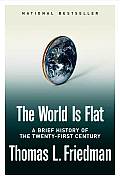 The World is Flat: A Brief History of the Twenty-First Century by Thomas L. Friedman
The World is Flat: A Brief History of the Twenty-First Century by Thomas L. FriedmanI'm done with this book. I have to admit that I skimmed the last 200 pages and below I'll explain why.
The idea behind this book is that the world is "flattening" with developing countries catching up to developed ones in areas of technology, education, and economic stability and growth. Where it used to be the civilized vs. the savage, the imperialists vs. the colonies now the world is flattening or, to use a word Friedman stears clear of, globalizing. Now you can have your taxes done in India, have your Catscans analyzed in Australia overnight, or have someone in Singapore help fix your laptop via phone. You can ride a bullet train in Japan and still have clear wireless service as you Google the sites of Kyoto. Everything is becoming more accessible and efficient therefore leading to a world that is flat, where everyone has similiar options. But is this a good thing?
The first section discusses the ten events he sees as leading to this flattening process. I found it very interesting, learned a lot about the evolution of the internet, and would recommend reading this area.
I would summarize the rest of the book as in-depth examples to support Friedman's "flattening" world. Many of the examples, such as the growth of Walmart and UPS, were ones I've previously read. There is an interesting discussion in which Harvard professor Michael J. Sandel points out that Friedman's notion of "flattening" was actually first identified by Karl Marx. Marx believed that globalization would lead to people uniting in global revolution to end oppression and it seems Friedman is blind to the oppression globalization creates. Later on Friedman mentions seven rules for companies on embracing the globalization process instead of fighting against it, what about the rest of us?
I decided to skim the rest of the book because I understood his argument and didn't need to have him constantly reinforce it through examples. I also saw his view of globalization was one-sided and doesn't address those countries where "flattening" has yet to occur for the masses. Too often it seemed that Friedman's world consisted of the US, EU, Japan, China and India. And so I have some questions and concerns.
Questions to Friedman:
1. What will a "flat world" mean to the world's poor?
2. What cultural values (or absence thereof) are contributing to the West's decline in education and excellence?
3. How will further globalization effect cultural distinctions?
4. What will a "flat world" mean environmentally - particularly for those countries on the verge of an economic explosion?
Kim's Grade: B I think this would be a great book to discuss with a class.
1 comment:
1. A "flat world" will affect the world's poor in varying degrees. In countries that are currently poor but which show signs of stable and transparent government, such as parts of Eastern Europe and Central America, businesses will move there to cut costs. The influx of foreign capital will improve the national economies and benefit the poor in the same way that industrialization improved the standard of living in countries like South Korea and Taiwan. In countries which are unstable and corrupt, businesses will avoid investment for fear that their investments will be destroyed in revolutions or civil unrest, or be seized by the strongman of the month. These countries will remain as poor as ever.
2. The West has a long history of anti-intellectualism which ties in with its history of egalitarian beliefs and movements. In addition, many Western nations have traditionally been wealthy enough that even the poorly educated have been able to secure basic needs. In other nations, a high level of education has been absolutely necessary to provide for one's family, which gives people in those countries greater incentive to study hard.
3. Cultural distinctions will remain, but in somewhat watered-down fashion. Think Irish-American as compared to Irish. Reactionary cultural forces will provoke conflict. Indeed, they already have in the Middle East.
4. A "flat world" will be a mixed blessing. Industrialization will bring new pollutants, but will also bring the revenue to enforce environmental regulations. For instance, many African nations are just too poor to prevent poaching. An improved tax base (combined with a less corrupt government, of course) would allow improved funding. Furthermore, newly introduced technology can improve existing environmental conditions, such as building sewer systems, replacing slash-and-burn agriculture with newer methods, etc.
So basically I'm a corporate whore.
Post a Comment